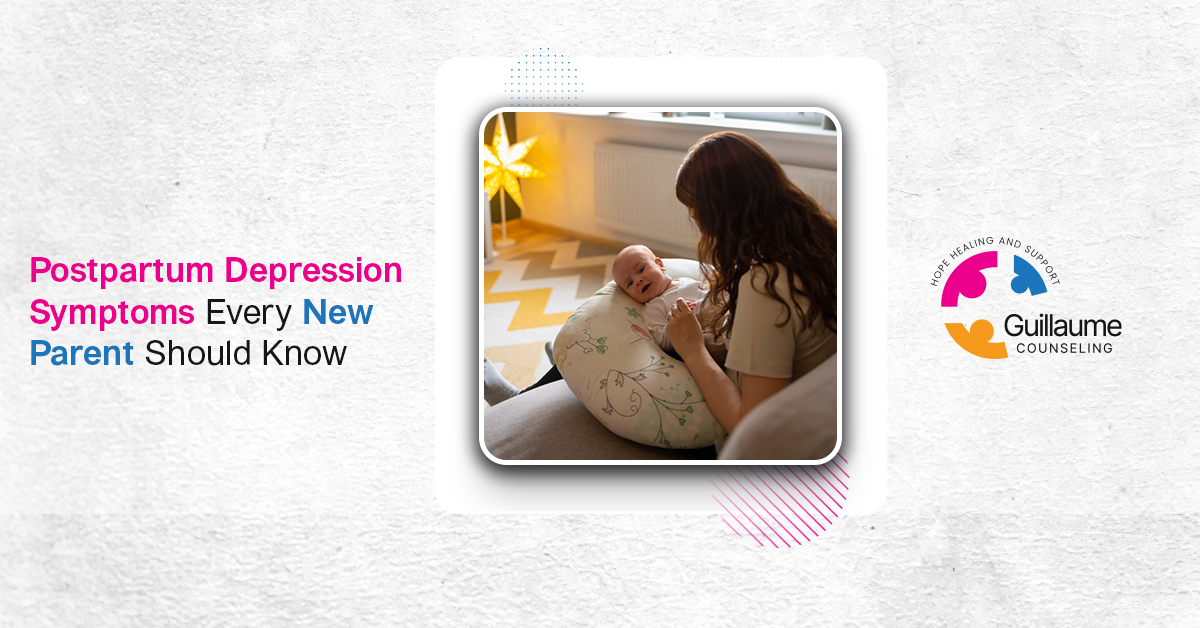Bringing a new baby home is exciting but can also feel overwhelming. Most new parents experience a mix of happiness, anxiety, and exhaustion. In some cases, such emotions can lead to postpartum depression (PPD).
Early identification of the possible postpartum depression symptoms can assist parents in investigating the support opportunities and acquiring ways to cope.
We provide mental health support for maternal and paternal well-being at Guillaume Counseling Services and Guillaume Marriage and Family Counseling.
Our psychotherapy services are designed to help parents navigate emotional challenges, develop coping strategies, and seek advice in a secure and culturally sensitive environment.
What Is Postpartum Depression?
Postpartum depression is a form of depression that can be experienced after giving birth. It can impact the mothers and the fathers.
Postpartum depression does not mean being weak or being a failure. It can form as a result of changing hormones, sleeping problems, stress, and changes accompanying the care of a newborn.
Postpartum depression is different from the baby blues. Baby blues describe minor mood swings that normally disappear after two weeks of birth. Postpartum depression may last longer, be more intense, and affect daily life.
Common Postpartum Depression Symptoms
Not all parents experience postpartum depression in the same way, but some common signs may include:
- Feeling Sad Most of the Time
The parent can be depressed or empty throughout the day. Even joyful situations do not necessarily feel joyful.
- Feeling Angry or Frustrated
Some parents are also easily upset. Such simple things as crying babies or chores can be complicated.
- Loss of Interest
Parents may quit enjoying previous pursuits, even sharing moments with their little one.
- Trouble Sleeping
Parents may struggle with sleep and often feel tired, even after sufficient rest.
- Changes in Eating
Some parents may eat more or less than usual, impacting stamina and spirit.
- Feeling Guilty or Worthless
A parent may believe they are falling short or not succeeding in their role. These sensations may relate to Postpartum depression.
- Trouble Bonding with the Baby
Some parents may feel disconnected. Psychotherapy may teach ways to strengthen this connection.
- Worrying a Lot
Parents can be highly concerned about the baby’s safety and daily activities.
- Trouble Focusing
Making the small tasks less critical, such as cooking, feeding, or remembering things, may be difficult.
- Scary Thoughts
Some parents may have harmful thoughts about themselves or their baby. Get support right away.
Potential Risk Factors of postpartum depression
Postpartum depression can affect any parent. Some factors that may increase risk include:
- A history of depression or anxiety
- Lack of social support or stressful life events.
- Complications at birth or difficulties during pregnancy.
- Hormonal fluctuations, or conditions.
- Issues with work, home, and parenting.
Dads and spouses can also suffer from postpartum depression. Burden, sleeplessness, and new-parent challenges may provoke symptoms.
Understanding Paternal Postpartum Depression
Postpartum depression in fathers may look different from that in mothers. Possible signs include:
- Being depressed, stressed, or angry.
- Shy to avoid responsibilities or socializing.
- Feeling disconnected from the baby or partner
- Taking drugs to get through stress.
- Inability to balance between work and family life.
Professional support, such as psychotherapy at Guillaume Counseling Services and Guillaume Marriage and Family Counseling, can help fathers learn strategies to manage these challenges.
Seeking Support and Care
While recovery looks different for each parent, there are ways to explore support:
- Mental Health Support
Guillaume Counseling Services and Guillaume Marriage and Family Counseling provide individual psychotherapy, family therapy, and group therapy. Our services allow parents to explore emotions, learn coping skills, and build relationships.
- Social Support
Friends, relatives, and community relations may help reduce stress and provide practical assistance with daily tasks.
- Support Groups
Group sessions or companion support can help parents learn from others’ experiences and feel more united.
- Self-Care Practices
Mood and well-being might be enhanced by small self-care activities such as rest, exercise, or personal interests.
- Culturally Special and Faith-Based Services
At Guillaume Counseling Services and Guillaume Marriage and Family Counseling, our psychotherapy is offered based on the diverse communities, such as African American/Black, Caribbean, Hispanic/Latino, South Asian, Southeast Asian, LGBTQ+, interfaith, and multicultural families.
The combination of faith, science, and culturally sensitive strategies can contribute to improving the support parents get.
The Importance of Early Recognition
Noticing postpartum depression symptoms early can help parents seek support sooner. Left untreated, postpartum depression may change everyday functions, mood patterns, and family connections.
Professional directions may equip parents with tools to cope and acquire ways of dealing with stress.
Moving Forward
Experiencing postpartum depression does not represent a parent’s failure. With the proper support, parents may learn ways to cope, recognize their feelings, and create healthier family dynamics.
At Guillaume Counseling Services and Guillaume Marriage and Family Counseling, we offer hope and support for new parents facing postpartum challenges.
Seeking help early may support recovery and help parents cope more effectively.
FAQs
Q: Can postpartum depression affect bonding with my baby?
Yes. Postpartum depression can make it harder to feel close to your baby. However, talking to a therapist and getting help can teach parents ways to feel more connected over time.
Q: How long does postpartum depression last?
It may extend for weeks or months, and each parent faces this variably. Psychotherapy can support parents in coping with symptoms, but improvement fluctuates for each individual.
Q: Can postpartum depression come back with another child?
Sometimes, postpartum depression can happen again with another baby. Early support can prevent or manage it by being sensitive to the symptoms.


No comment